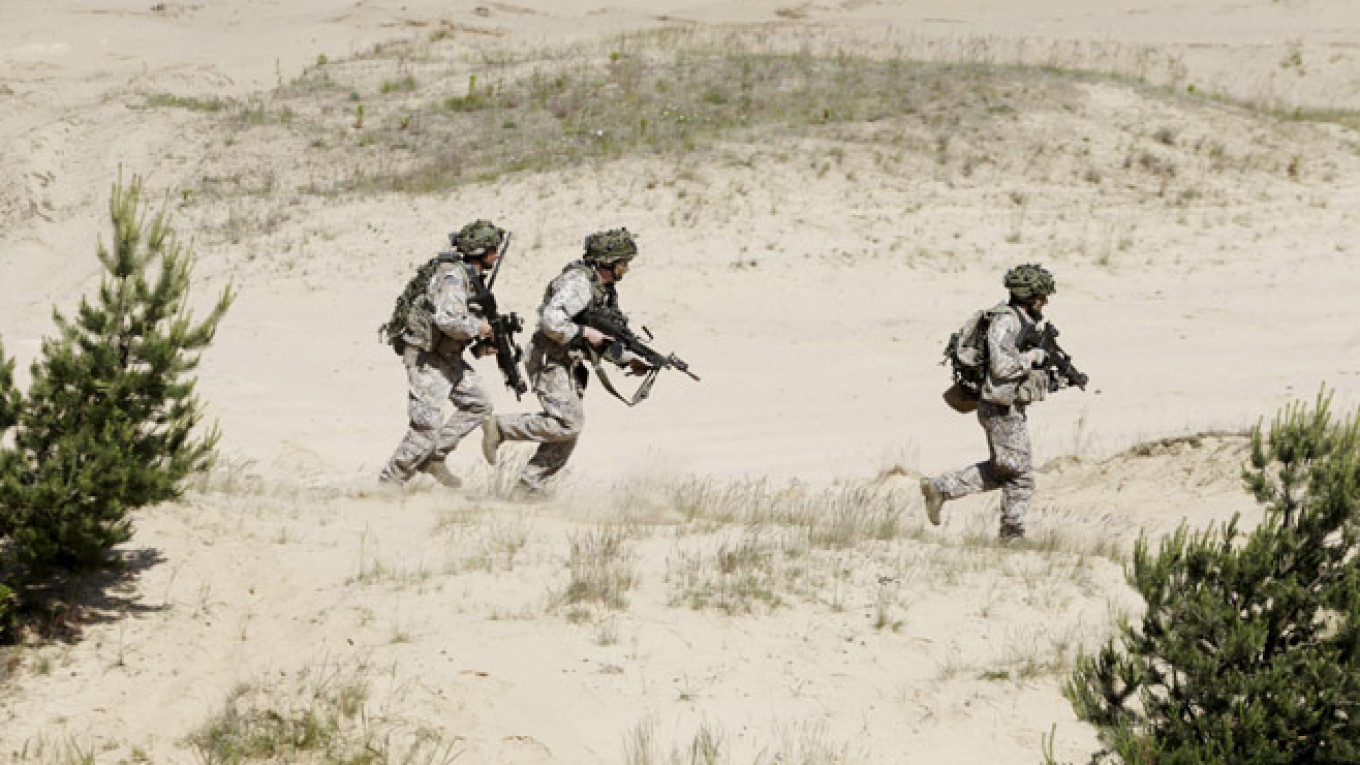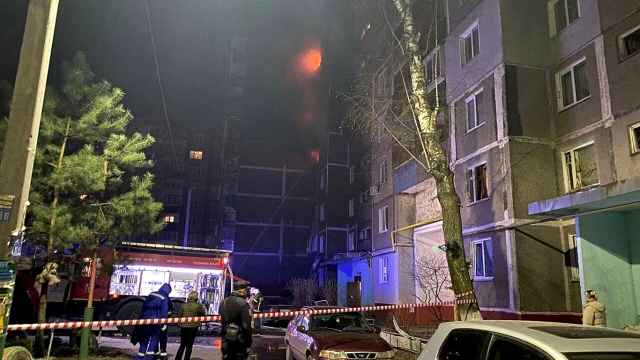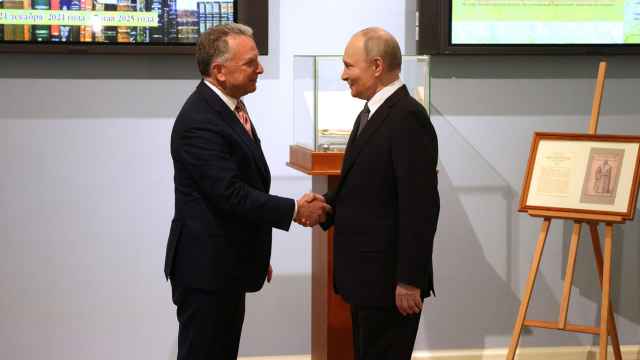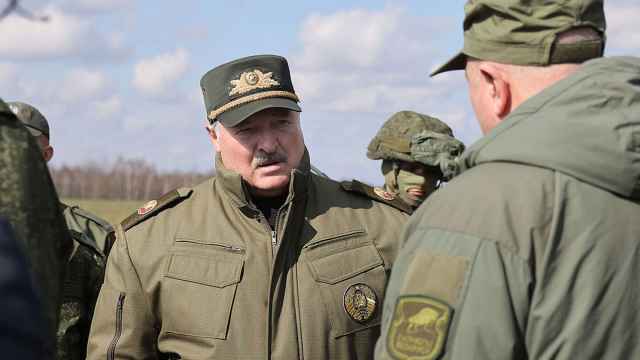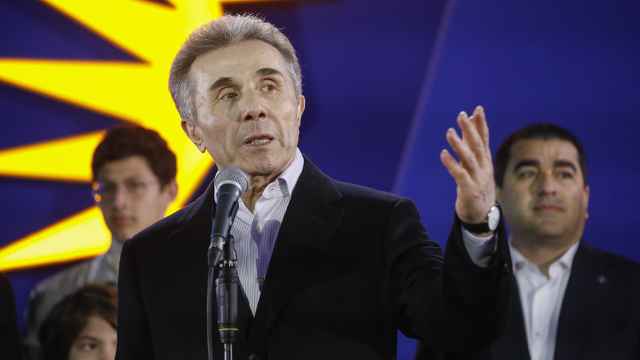RIGA — Rows of soldiers walking two by two filed through the cobbled streets of Old Riga, their forest green berets tipped to the right, patches bearing their country's flag sewn to the left sleeves of their camouflage combat uniforms.
Wandering the Latvian capital with his fellow soldiers on Saturday morning, Estonian Major General Alar Jarv described them as tourists in boots. But the servicemen are not like the tourists in camouflage who appeared in Crimea in Feb. 2014, their uniforms devoid of insignia, and seized government buildings on the eve of Russia's annexation of the peninsula.
Some 6,000 soldiers from 13 NATO countries have gathered in Latvia, Estonia, Lithuania and Poland to take part in the Saber Strike, an annual series of large-scale military exercises. Wary that Russia's annexation of Crimea could be a prelude to the redrawing of its own borders, Latvia has fretted over its eastern neighbor's recent displays of military might in the Baltic region.
A week rarely goes by without Latvia's armed forces spotting a Russian military aircraft, vessel or submarine prowling in the Baltic Sea near Latvian territorial waters. (See related story, page 3.) Between January and May, the military recorded more than 50 instances of Russian military units having been in close proximity with the country's borders, according to public broadcaster LSM.
Latvia's apprehensions, which Russia has claimed are deliberate attempts to extort resources from the European Union and NATO, are deeply ingrained in the Baltic country's national psyche and flare up whenever Russia engages in hawkish actions and rhetoric, according Latvian officials and political analysts.
Russian officials have insisted that Latvia and the other Baltic states — Estonia and Lithuania — have no reason to worry. Russia's ambassador to Latvia, Alexander Vishnyakov, said in December that Russia's military presence in the Baltic region was necessary to ensure contact between Kaliningrad, a Russian exclave nestled between Lithuania and Poland, and the rest of the country.
President Vladimir Putin has also offered reassurances. But his most recent attempt to soothe Western fears that Russia could attack the former Soviet republics of Latvia, Estonia and Lithuania — NATO members since 2004 — appears to have missed the mark.
In an interview with Italian newspaper Corriere della Sera earlier this month, Putin accused some EU countries of deliberately fostering a fear of Russia, motivated by their own self interests.
"I think that only an insane person — and only in a dream — can imagine that Russia would suddenly attack NATO," Putin said, according to a transcript of the interview published by the Kremlin. "I think some countries are simply taking advantage of people's fears with regard to Russia. They just want to play the role of front-line countries that should receive some supplementary military, economic, financial or some other aid."
Latvia's defense budget for 2015 is nearly 254 million euros ($286 million), a figure that represents a 12 percent increase in the past year and approximately 1 percent of its GDP. Latvia has vowed to reach the 2 percent GDP threshold that every NATO nation pledges as its goal for military expenditure by 2020.
Latvia's membership in NATO means, at least in theory, that the country of 2 million would not be left alone to fend off Russian troops in the event of an attack.
NATO Secretary-General Jens Stoltenberg said earlier this month that Russia did not pose an "immediate threat" to its member states, but noted that unpredictability, insecurity and unrest were on the rise.
"When people see there is a large military build-up [in Russia], when they see the destabilization in Ukraine and the heavy emphasis on military language, it gives them reason for concern," Soren Liborius, spokesman of the EU delegation to Russia, told The Moscow Times. "People pay more attention to what Russia does than to what Putin says."
A Long History
Latvia, Estonia and Lithuania still bear the scars of 20th-century occupations by foreign powers, including the Soviet Union and Nazi Germany.
To this day, the Baltic states and Russia vehemently disagree on the nature of the Molotov-Ribbentrop Pact signed by the Soviet Union and Nazi Germany in 1939; its secret protocols divided eastern Europe into the two countries' respective spheres of influence. Latvia was first occupied by the Soviet Union in 1940. After Germany occupied the country between 1941 and 1944, Latvia was occupied once again by the Soviet Union, and remained a Soviet republic until 1991.
Moscow has not recognized as such the Soviet Union's occupation of the Baltic states and maintains that their governments willingly agreed to join the country.
Two mass deportations of Latvians to Siberia were conducted during the Soviet era. The first was in 1941. Sunday marked its 74th anniversary. Black ribbons were attached to Latvian flags throughout Riga in honor of its victims.
According to the Latvian Foreign Ministry, during the second mass deportation in 1949, more than 42,000 Latvians were sent to labor camps and administrative settlements constructed to house family members of "enemies of the people."
"It's not that we spend sleepless nights because of pathological fear," Andrejs Pildegovics, state secretary for Latvia's Ministry of Foreign Affairs, told The Moscow Times. "But when borders are changed in a matter of days, when mock referendums are staged, when obnoxious propaganda is fanning hate speech, those cases evoke a lot of negative memories from the mid-20th century. These are not Russophobic fears. These fears are about dictatorships and unilateral decisions taken with disregard for the integrity of states, borders and fundamental freedoms."
Constant Fear
Fear of Russia is a constant in Latvian society, according to recent studies. In an interview with LSM in March 2014, Latvian sociologist Arnis Kaktins claimed that even prior to the outbreak of the Ukrainian crisis, almost one-tenth of the Latvian population feared the country could be reintegrated into Russia. Before the Ukraine crisis began, one-third of the Latvian population was more fearful that the country was relinquishing its sovereignty to the EU than it was wary of Russian aggression, according to Kaktins.
Latvia's fears regarding Europe, and the NATO allies generally, have revolved around their seeming reluctance to assist the country in the event of a Russian attack.
A poll published by the Washington-based Pew Research Center earlier this week found that while the populations of many NATO states are distrustful of Moscow, many would also be hesitant to defend a NATO member that neighbors Russia. Despite popular sentiment, Article 5 of the NATO convention stipulates that an attack against any member should be construed as an attack against all.
More than half of the respective populations of France, Germany and Italy would not support the use of military force to defend a NATO ally in the event of a Russian attack, according to the poll. Meanwhile, 56 percent of Americans would support such a military intervention. More than 11,000 people in eight NATO states were surveyed. The poll's margin of error was not immediately available.
Prominent Latvian newspaper Diena said the poll's findings were a cause for concern for the Baltic states.
The Media Factor
According to Ivars Ijabs, an associate professor of political science at the University of Latvia, media coverage of the Ukrainian crisis, both in Russia and the West, has exacerbated the Latvian population's unease toward the prospect of an attack against their country.
"We sometimes watch Russian federal channels here in Latvia," Ijabs said. "Let's just say that the coverage does not contribute to peaceful relations."
The notion that Russia's state narrative could win support in the country is linked to Latvia's ethnic and linguistic composition. Russian speakers comprise some 30 percent of the country's population.
Russia has accused Latvia of mistreating its native Russian speakers, having disenfranchised them in the early years of the post-Soviet era and leading some 13 percent of the population to remain "non-citizens" of the country. "Non-citizens" are barred from voting and occupying certain government positions. They can naturalize only after having taken a Latvian history and language test, a process Russian rights groups have denounced as discriminatory.
Ukraine's alleged poor treatment of its Russian population had been one of the reasons invoked by Moscow for the annexation of Crimea. In Latvia, Russia's land grab has sparked fears that similar accusations could trickle down to Russian speakers and jeopardize the country's sovereignty, especially in the heavily Russian-speaking region of Latgale.
Latvia's National Electronic Mass Media Council banned the Rossia-RTR television channel for a three-month period last year, claiming the distorted information it presented was detrimental to the country's national security interests.
Latvia also approved in March a plan to set up its own Russian-language state-run news outlet. The channel is expected to begin broadcasting in late 2016, according to LSM.
"How can we not be afraid of Russia if we turn on our televisions [and tune into Russia state-run channels] and see politicians suggesting Russia could come for us next?" wondered Raimonds Barins, a 49-year-old handyman. "This type of information is not coming from unimportant channels, but from national ones. What are we supposed to think?"
The Moscow Times was a guest of seminars hosted by the European Union Delegation to the Russian Federation and Latvia's Ministry of Foreign Affairs.
Contact the author at g.tetraultfarber@imedia.ru
A Message from The Moscow Times:
Dear readers,
We are facing unprecedented challenges. Russia's Prosecutor General's Office has designated The Moscow Times as an "undesirable" organization, criminalizing our work and putting our staff at risk of prosecution. This follows our earlier unjust labeling as a "foreign agent."
These actions are direct attempts to silence independent journalism in Russia. The authorities claim our work "discredits the decisions of the Russian leadership." We see things differently: we strive to provide accurate, unbiased reporting on Russia.
We, the journalists of The Moscow Times, refuse to be silenced. But to continue our work, we need your help.
Your support, no matter how small, makes a world of difference. If you can, please support us monthly starting from just $2. It's quick to set up, and every contribution makes a significant impact.
By supporting The Moscow Times, you're defending open, independent journalism in the face of repression. Thank you for standing with us.
Remind me later.


